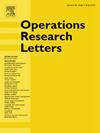动态博弈中联盟形成的动态稳定性
IF 0.8
4区 管理学
Q4 OPERATIONS RESEARCH & MANAGEMENT SCIENCE
引用次数: 0
摘要
本文探讨了动态博弈中联盟分区的稳定性,特别是引入了动态博弈中动态稳定纳什联盟分区的概念。我们重点讨论了联盟作为统一博弈方的纳什均衡,并讨论了博弈方没有动力转换联盟的动态稳定性。通过对 "鱼战 "的案例研究,我们利用时间一致的估算分配程序,沿着最优轨迹分配报酬,说明了动态稳定发生的条件。本文章由计算机程序翻译,如有差异,请以英文原文为准。
Dynamic stability of coalition formation in dynamic games
This paper explores the stability of coalition partitions in dynamic games, specifically introducing a concept of dynamically stable Nash coalition partition for dynamic games. We focus on a Nash equilibrium where coalitions act as unified players and discuss dynamic stability, where players have no incentive to switch coalitions. A case study on “fish wars” illustrates conditions under which dynamic stability occurs, utilizing a time-consistent imputation distribution procedure to allocate payoffs along optimal trajectories.
求助全文
通过发布文献求助,成功后即可免费获取论文全文。
去求助
来源期刊

Operations Research Letters
管理科学-运筹学与管理科学
CiteScore
2.10
自引率
9.10%
发文量
111
审稿时长
83 days
期刊介绍:
Operations Research Letters is committed to the rapid review and fast publication of short articles on all aspects of operations research and analytics. Apart from a limitation to eight journal pages, quality, originality, relevance and clarity are the only criteria for selecting the papers to be published. ORL covers the broad field of optimization, stochastic models and game theory. Specific areas of interest include networks, routing, location, queueing, scheduling, inventory, reliability, and financial engineering. We wish to explore interfaces with other fields such as life sciences and health care, artificial intelligence and machine learning, energy distribution, and computational social sciences and humanities. Our traditional strength is in methodology, including theory, modelling, algorithms and computational studies. We also welcome novel applications and concise literature reviews.
 求助内容:
求助内容: 应助结果提醒方式:
应助结果提醒方式:


